The scope of data analysis has expanded with the increasing production of data daily, which has also significantly raised the demand for data analysts. It is a meticulous and detailed job. Hence, the data analyst's salary has increased significantly over the years across the globe. Data analysts are among the highest-paid professionals.
This title will help you grow technically and financially and expose you to different domains – finance, education, telecom, sports, and many more fields. Even if your ultimate goal is to be a data scientist, it is good to start your career as a data analyst and then move up the ladder.
Let us discuss in detail the data analyst salary in different countries and the affecting factors.
Who is a Data Analyst?
Before that, let us have a brief introduction to data analysis.
It is the process of collecting and processing data to extract valuable insights and make reliable decision-making. This entire process consists of the following steps:
-
Identify data to be analyzed.
-
Collecting data.
-
Cleaning it – eliminating redundant data, adding missing values, and correcting inconsistencies.
-
Interpreting the data to uncover hidden patterns and trends.
Check out: What is Data Analysis?
A data analyst collects, cleans, and interprets datasets to help businesses and organizations make actionable decisions. They help businesses real-world solve problems with the help of data.
Simply put, they are professionals with the skills and knowledge to transform raw data into information/insights that are critical in the decision-making process. They are responsible for running the business smoothly.
Roles and Responsibilities
-
Classify: Data analysts first understand an organization's issues and classify them as what’s, why’s, and how’s.
-
Assemble: Next, they collect data from various sources to find solutions to the identified business problems. They refer to both internal and external sources to collect data.
-
Clean: After collecting data, they proofread it and eliminate redundancy, discrepancies, inconsistencies, and irrelevant information. Also, this step includes adding missing information to data sets.
-
Analyze: This step includes looking for various trends, patterns, and correlations in data variables.
-
Interpret: Finally, data analysts derive conclusions from these trends and patterns that aid decision-making and share them with business leaders.
Some other responsibilities include:
-
Creating and managing data systems, such as databases , data warehouses, etc.
-
Defining business goals.
-
Updating existing data reporting systems.
-
Carry out frequent analysis to understand customer queries and help businesses provide solutions that meet customer needs.
-
Create data mapping techniques to solve intricate business queries.
-
Outline a suitable methodology to get positive results.
Data Analyst Salary in India and Different Countries
The number of openings for data analysts increased manifold over the past few years. So, becoming one is beneficial in terms of professional growth and financial stability.
Career Paths
Undoubtedly, these data professionals get handsome salaries. Along with the base salary, they get bonus components and profit sharing.
However, certain factors decide the salary of a data analyst. They are as follows:
-
Level of experience
-
Location of work
-
Skills
-
Type of industry
-
Company
Let us discuss each of them in detail below.
1. Level of Experience
Experience is the deciding factor for the salary of any professional. The more years of experience, the more salary you earn. This is because an experience in a specific field demonstrates one’s knowledge and skills. Also, experienced professionals are very well aware of the job responsibilities and work culture. They possess leadership skills through which they can train others.
Let us now discuss the average salary of entry-level, mid-level, and senior data analysts in different countries.
The United States
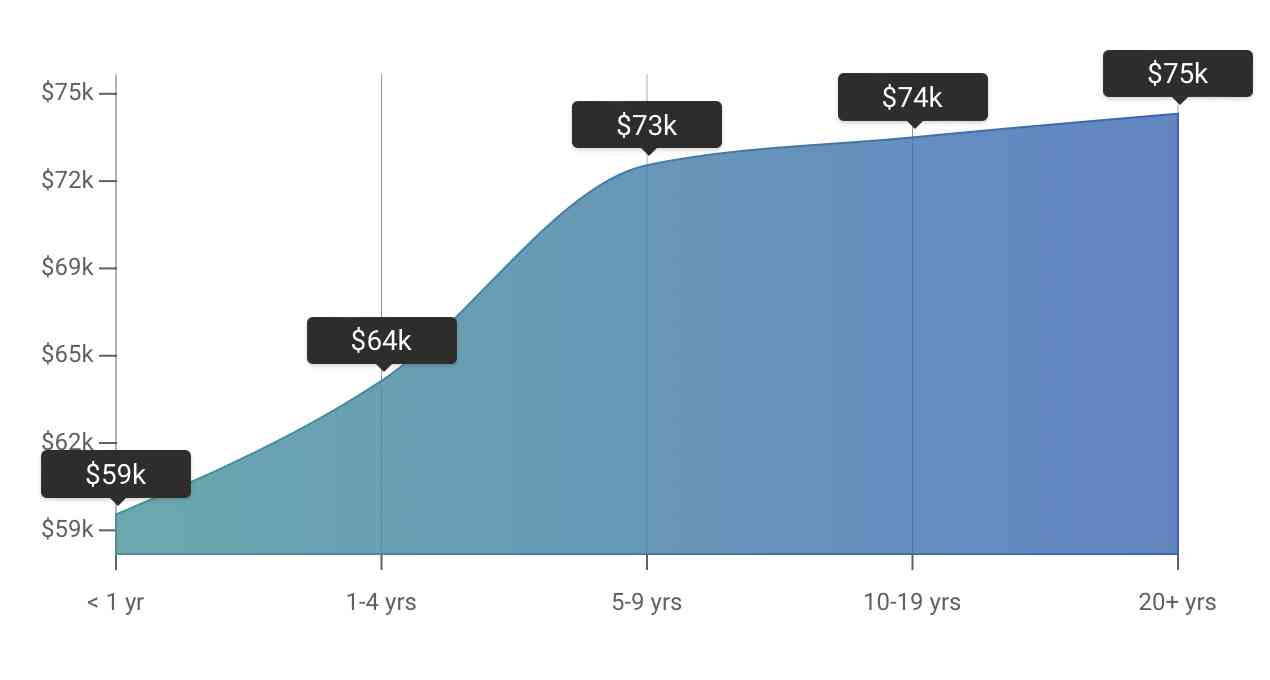
|
Experience |
Average Salary Per Annum |
|
|
The United Kingdom
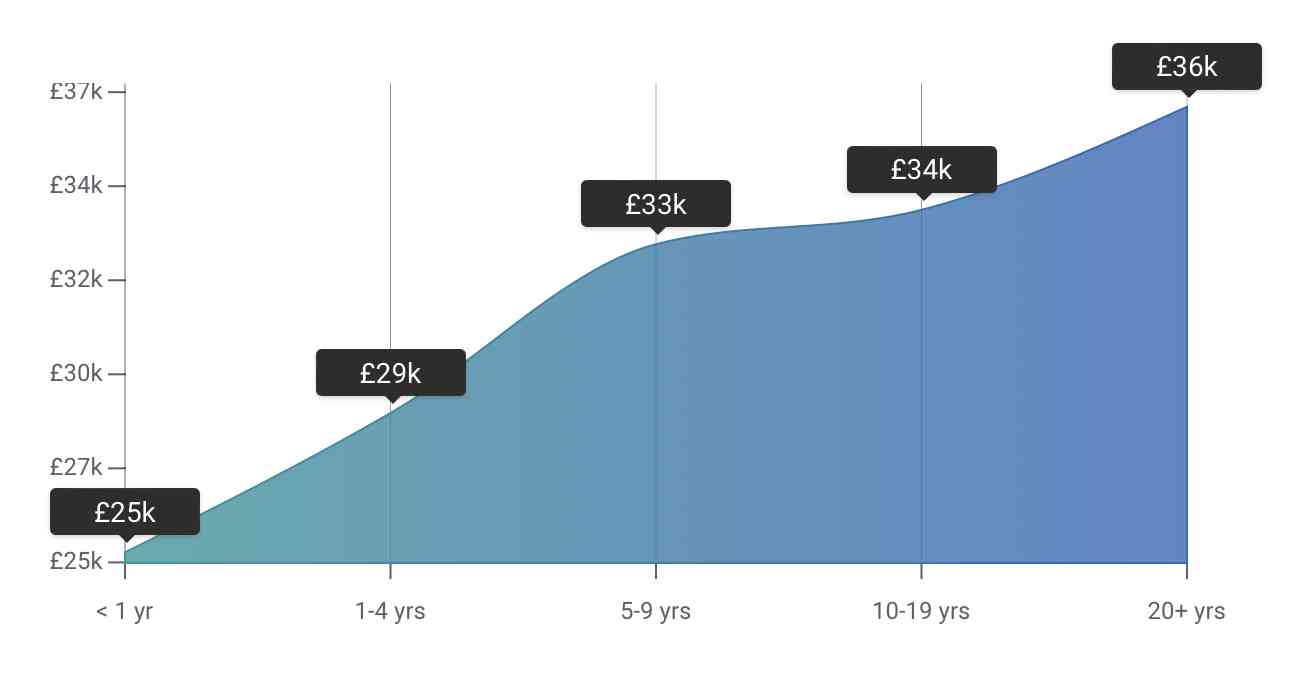
|
Experience |
Average Salary Per Annum |
|
|
India
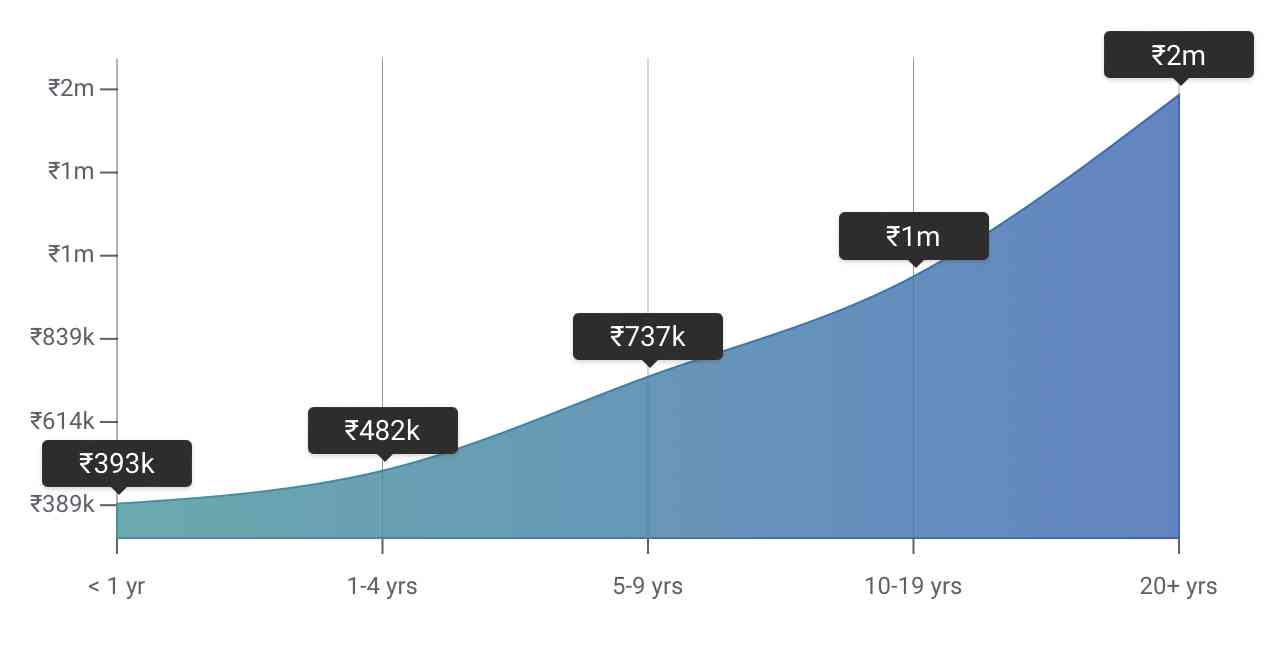
|
Experience |
Average Salary Per Annum |
|
|
Germany
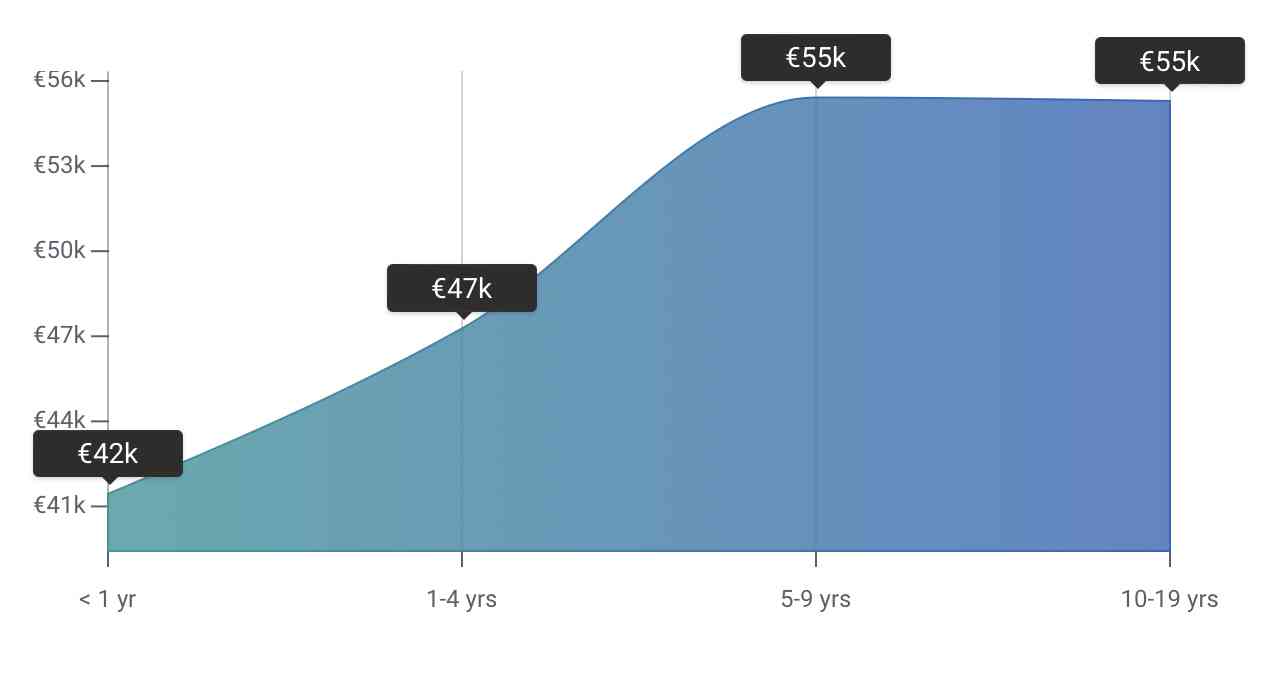
|
Experience |
Average Salary Per Annum |
|
|
Canada
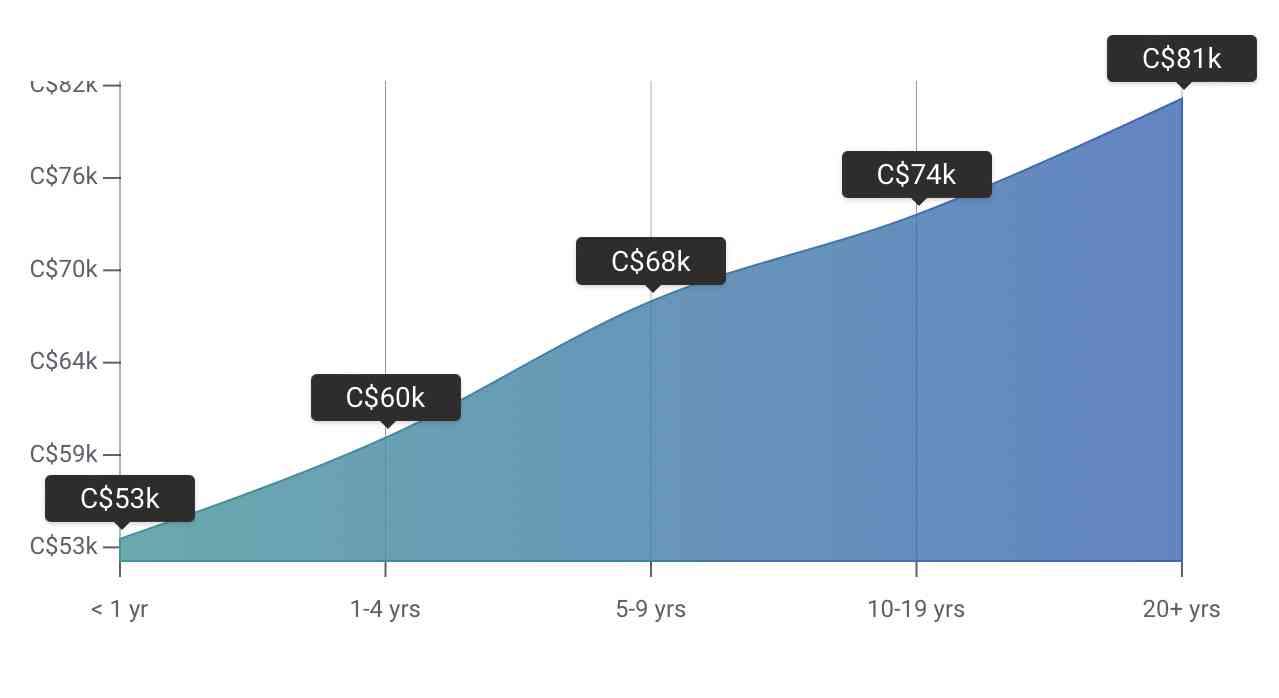
|
Experience |
Average Salary Per Annum |
|
|
France
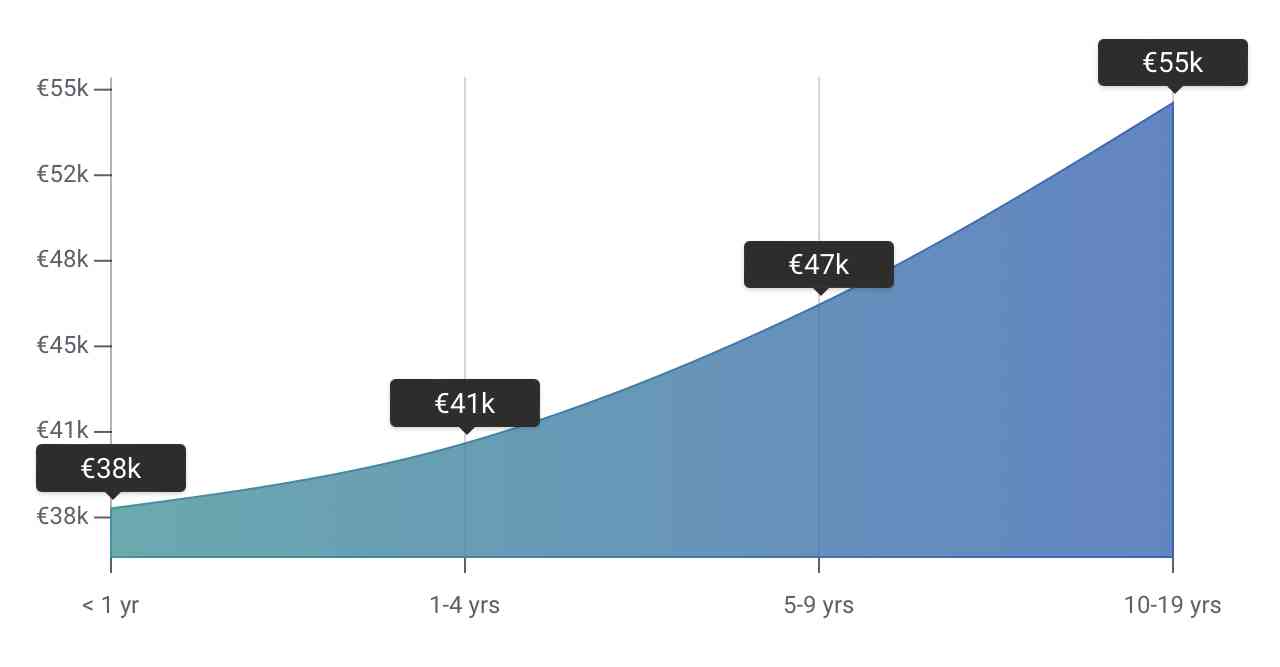
|
Experience |
Average Salary Per Annum |
|
|
Australia
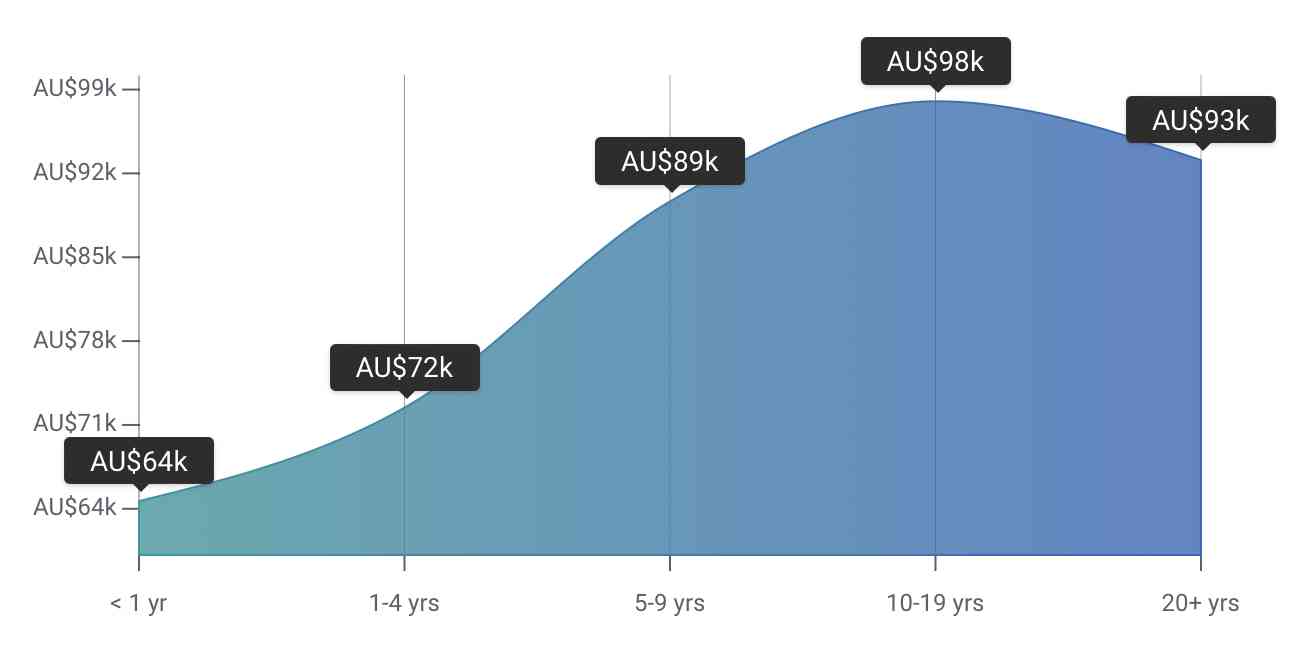
|
Experience |
Average Salary Per Annum |
|
|
2. Location
The location is also a major factor in deciding the data analyst's salary. The cities with more companies have a demand for data analysts; hence pay good salaries to them. Also, each city has a different cost of living.
Let us now highlight the salaries based on different locations in different countries.
The United States

|
Cities |
Average Salary per Annum |
|
|
The United Kingdom

|
Cities |
Average Salary per Annum |
|
|
India

|
Cities |
Average Salary per Annum |
|
|
Germany

|
Cities |
Average Salary per Annum |
|
|
Canada

|
Cities |
Average Salary per Annum |
|
|
Australia

|
Cities |
Average Salary per Annum |
|
|
Source – PayScale
3. Skills
A data analyst requires a set of skills to accomplish their job. As it is not possible to master all the required skills, every data analyst has a different area of expertise. For example, one must be extremely good at using Microsoft Excel, while the other may be proficient in Tableau or any other data analysis and visualization software. In addition, some professionals may hold hands-on experience with Python, while some may be skilled in R.
The United States
|
Skills |
Average Salary Per Annum |
|
|
The United Kingdom
|
Skills |
Average Salary Per Annum |
|
|
India
|
Skills |
Average Salary Per Annum |
|
|
Germany
|
Skills |
Average Salary Per Annum |
|
|
Canada
|
Skills |
Average Salary Per Annum |
|
|
France
|
Skills |
Average Salary Per Annum |
|
|
Australia
|
Skills |
Average Salary Per Annum |
|
|
Source – PayScale
4. Type of Industry
These professionals are found in various industry verticals – medical and health care, finance, marketing, business, science, and information technology. Based on these domains, the roles and responsibilities of data analysts change.
The following are the different types of data analysts:
-
Business Analysts
They convert data-driven insights and key information into business suggestions, helping businesses bring improvements in their decision-making. They identify problems in various business aspects – IT processes, employee development, operations, and organizational structures. Usually, they use SQL, Excel and Tableau .
According to Glassdoor , the average base pay of business analysts is $81K per annum.
-
Financial Analysts
They create financial models by analyzing micro and macroeconomic trends and predictions about the company’s performance based on the financial data.
Financial analysts earn an average salary of $76K per annum, according to glassdoor .
-
Healthcare Data Analysts
They use data for customer information, manage customer records, and smoothen administration tasks, patient care, and overall operations.
Glassdoor states the annual average salary of these professionals as $75K.
-
Market Research Analysts
They use sales, customer surveys, and competitor research data to plan marketing strategies and optimize targeting and positioning efforts. They must be creative in formulating new strategies and developing new stories and ideas. Primarily, they work with R/Python, SPSS ( Statistical Package for the Social Sciences ), SAS, and Excel.
These professionals earn an average base pay of $64K, according to glassdoor .
-
Transport Data Analysts
They determine gaps in the inefficiencies and budget variances and recommend improving the entire process of timeliness, types of goods, cost, and other factors. Amazon is currently the top employer of transportation analysts. They work with Excel, SQL, and logistics management.
These analysts receive a pay scale of $68K per year, as per the data from glassdoor .
5. Companies
As the role of data analysts varies slightly from company to company, so does the salary. Every employer offers a different salary. Renowned and well-established tech giants, such as Microsoft, Amazon, Meta, PayPal, Google, and many more, offer more salaries than new companies and startups.
Let us now discuss the salaries offered by various companies in different countries.
The United States
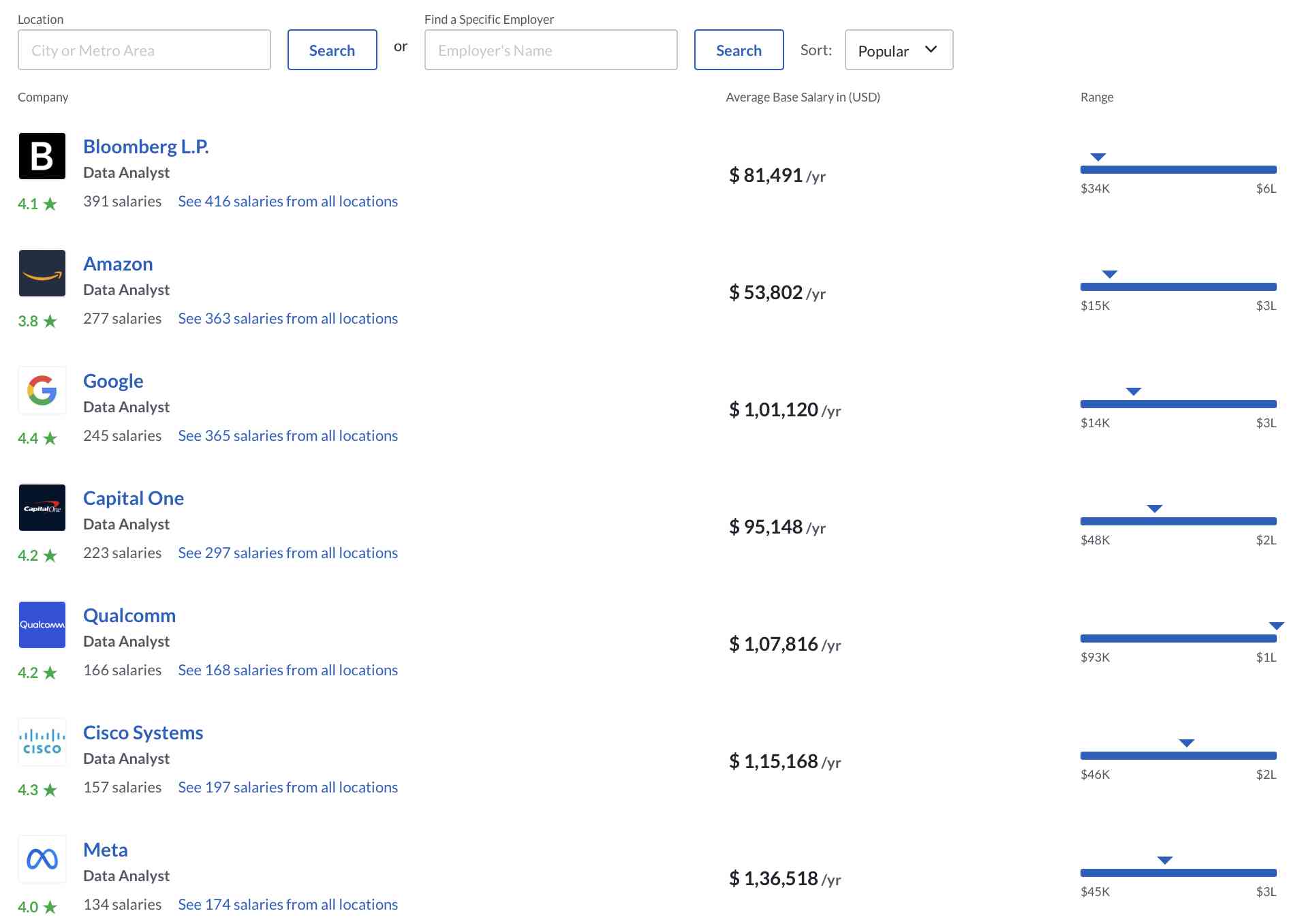
The United Kingdom
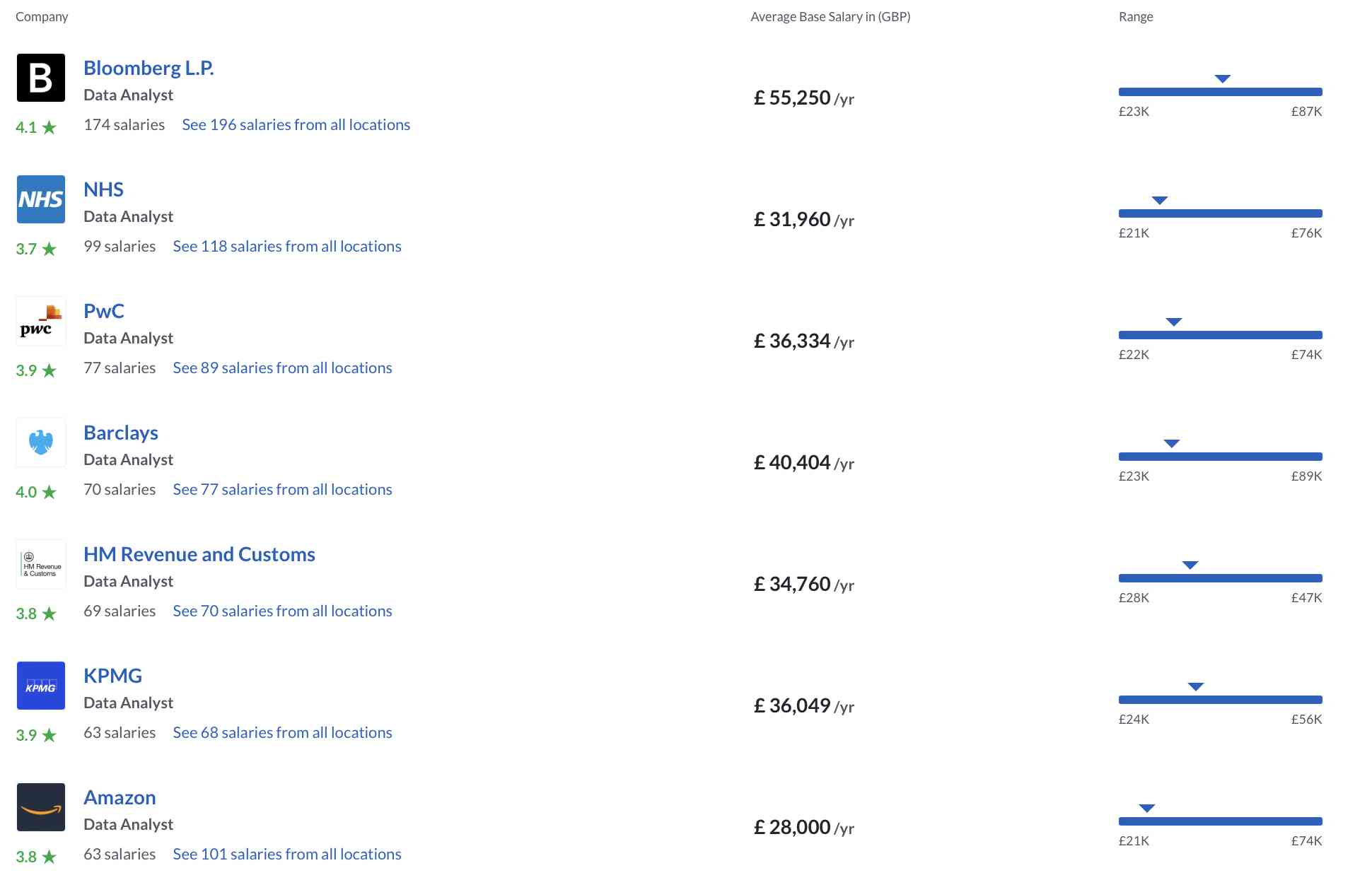
India
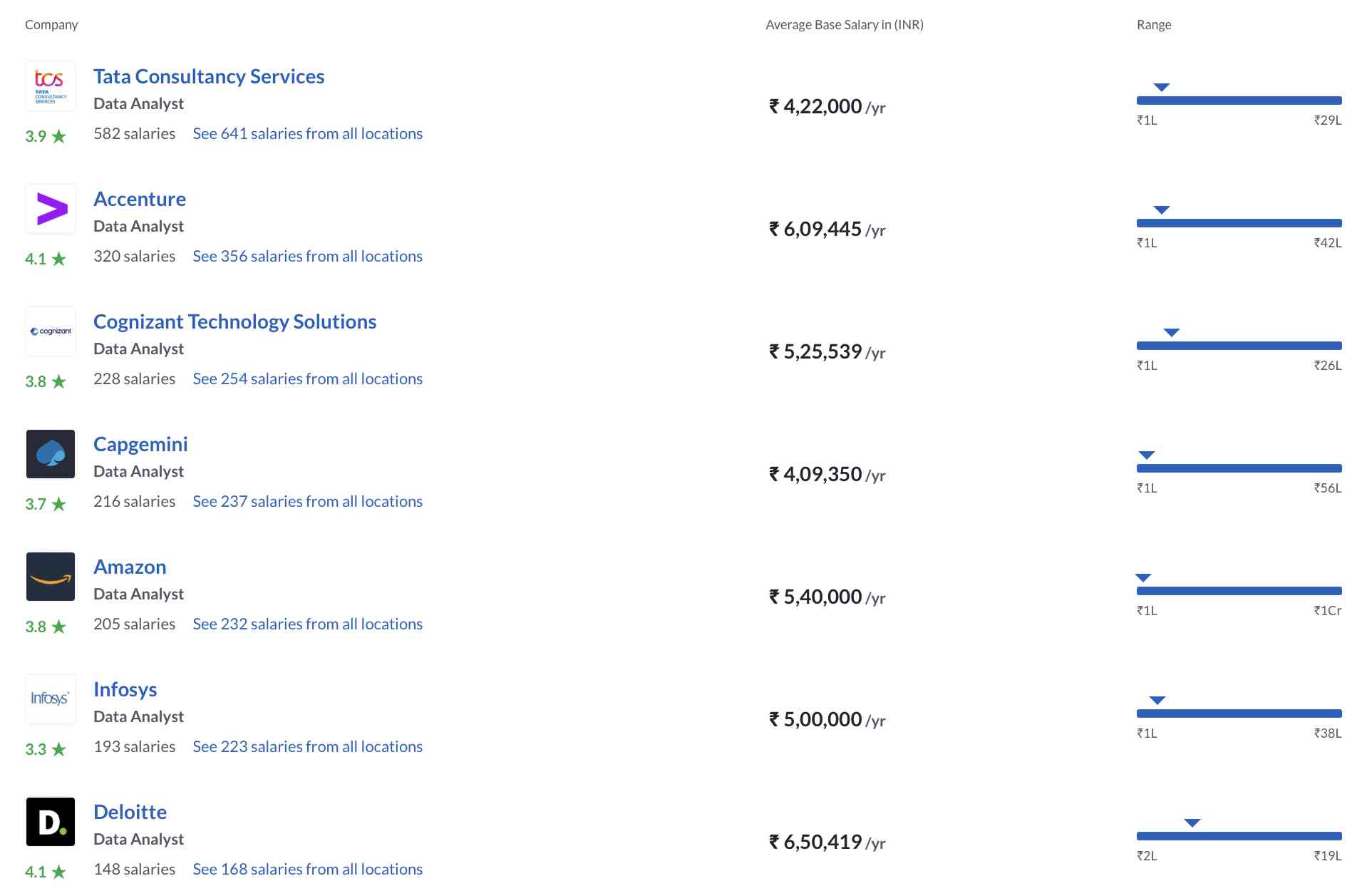
Germany
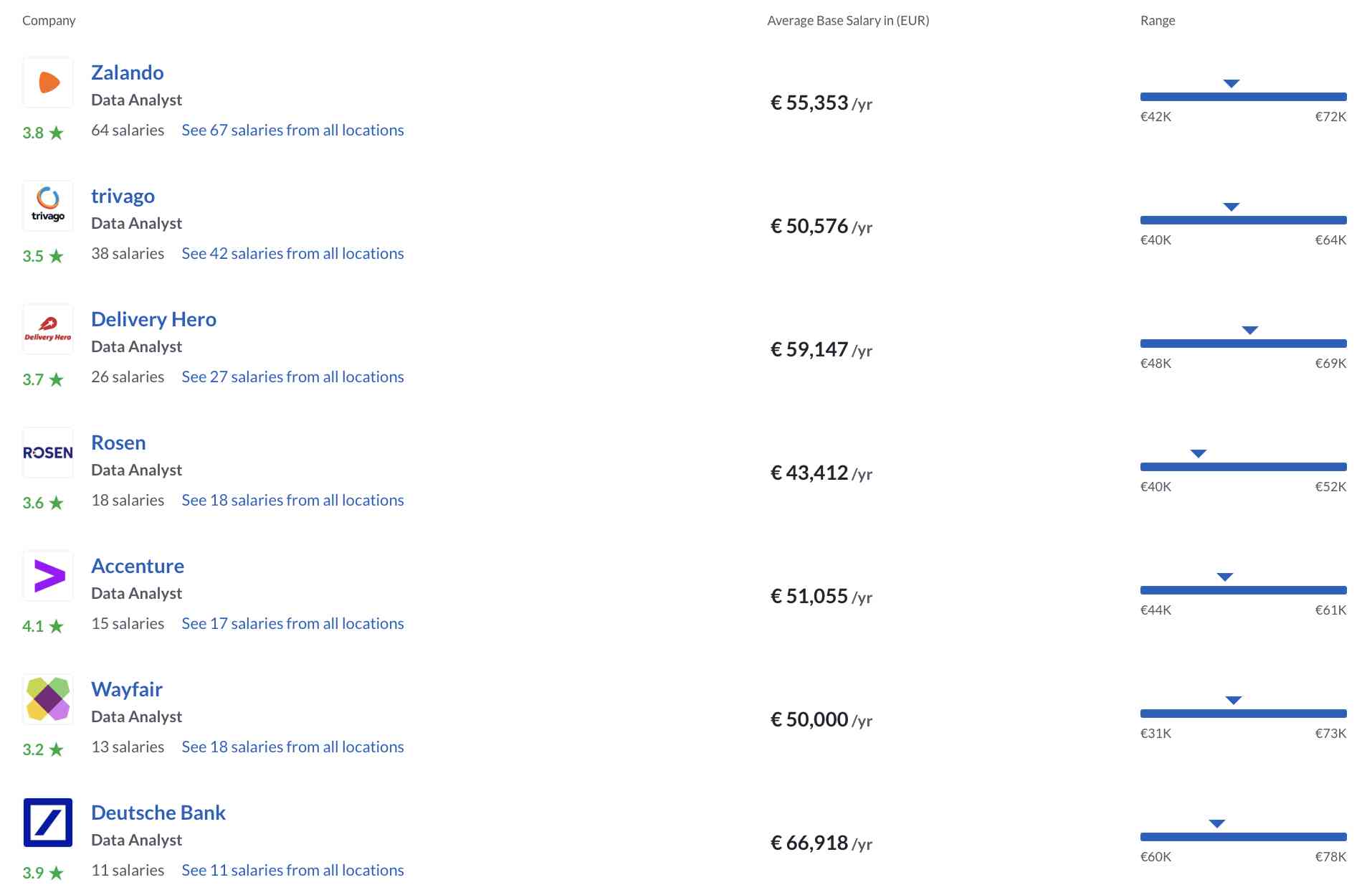
Canada
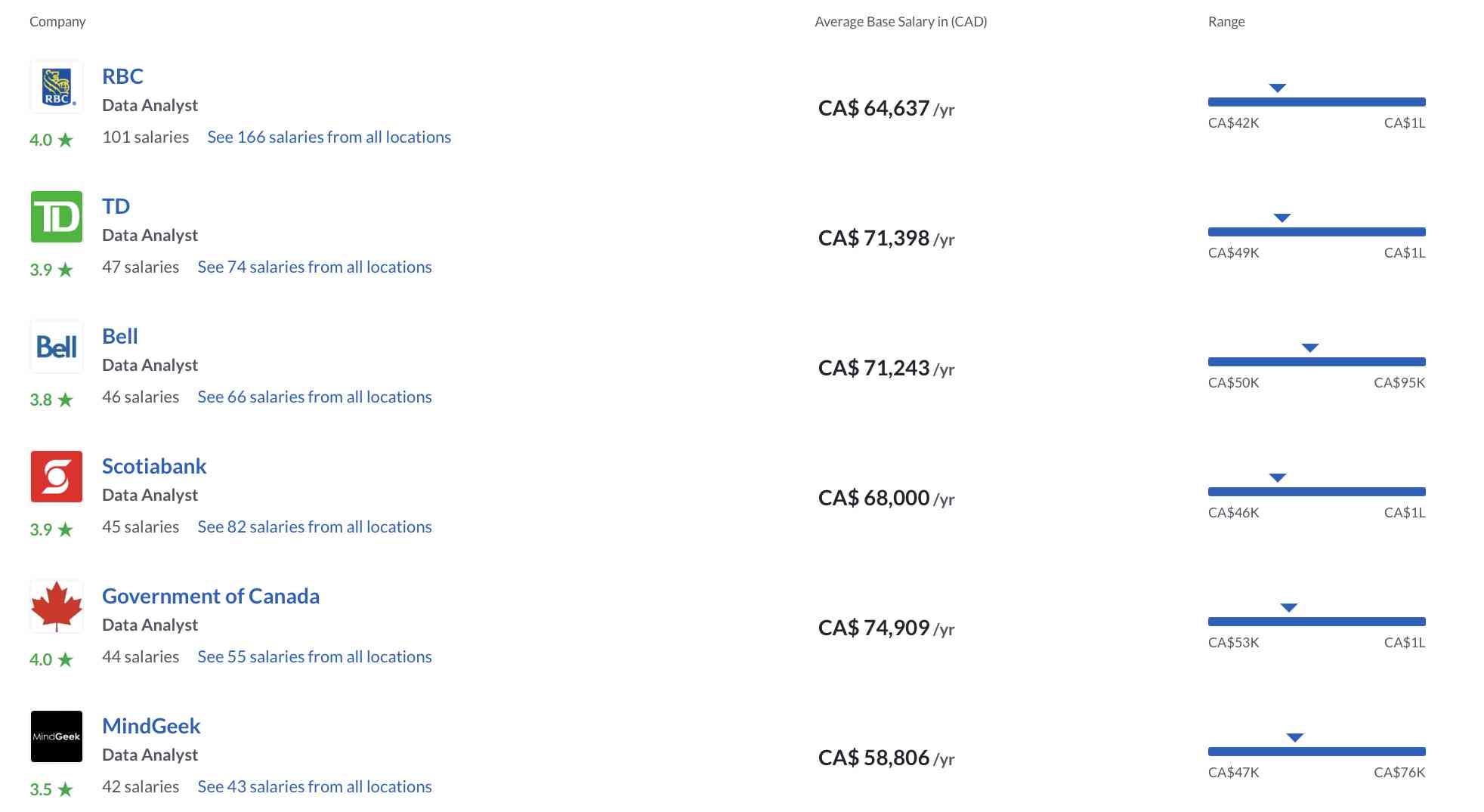
France
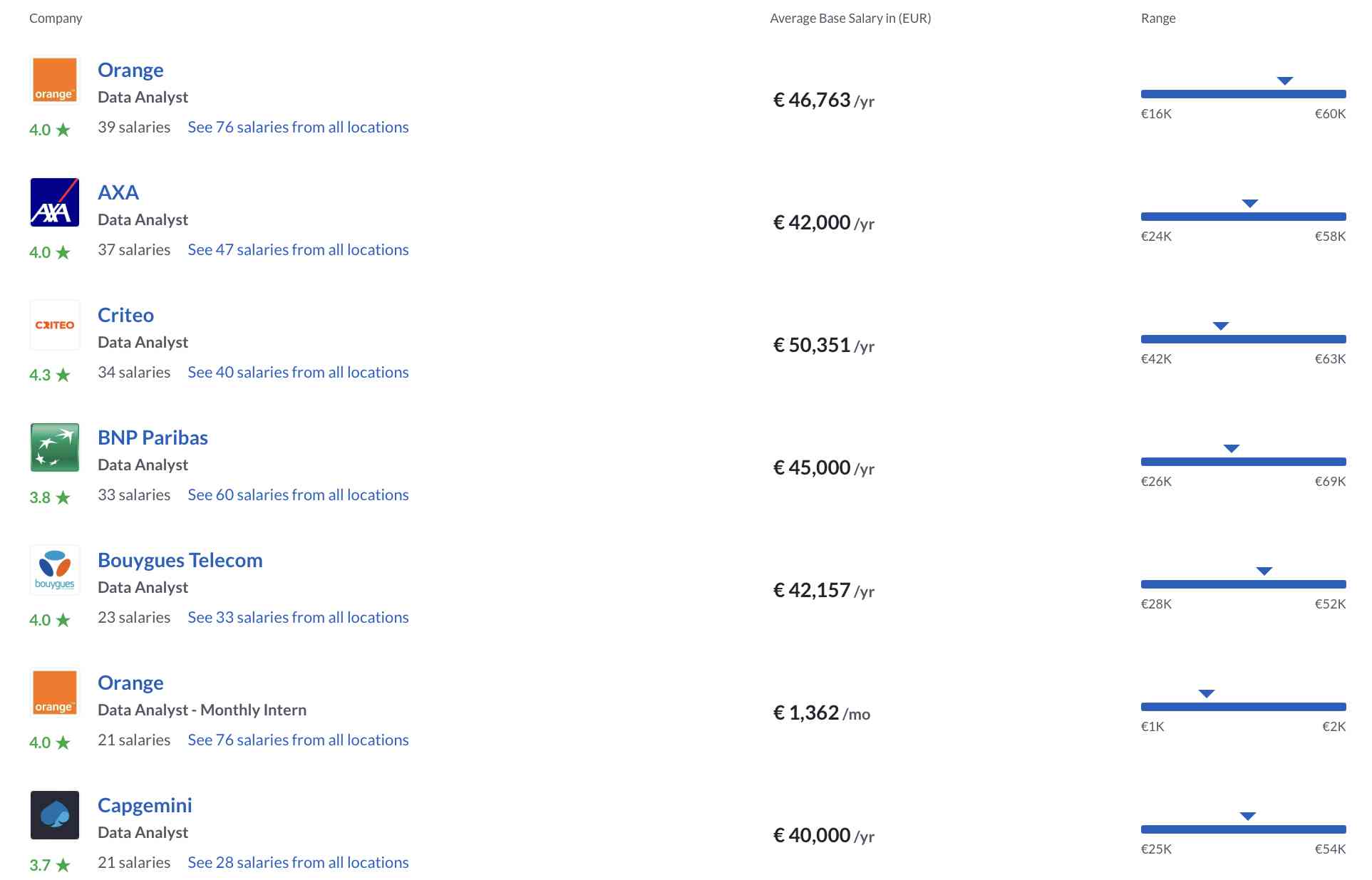
Australia
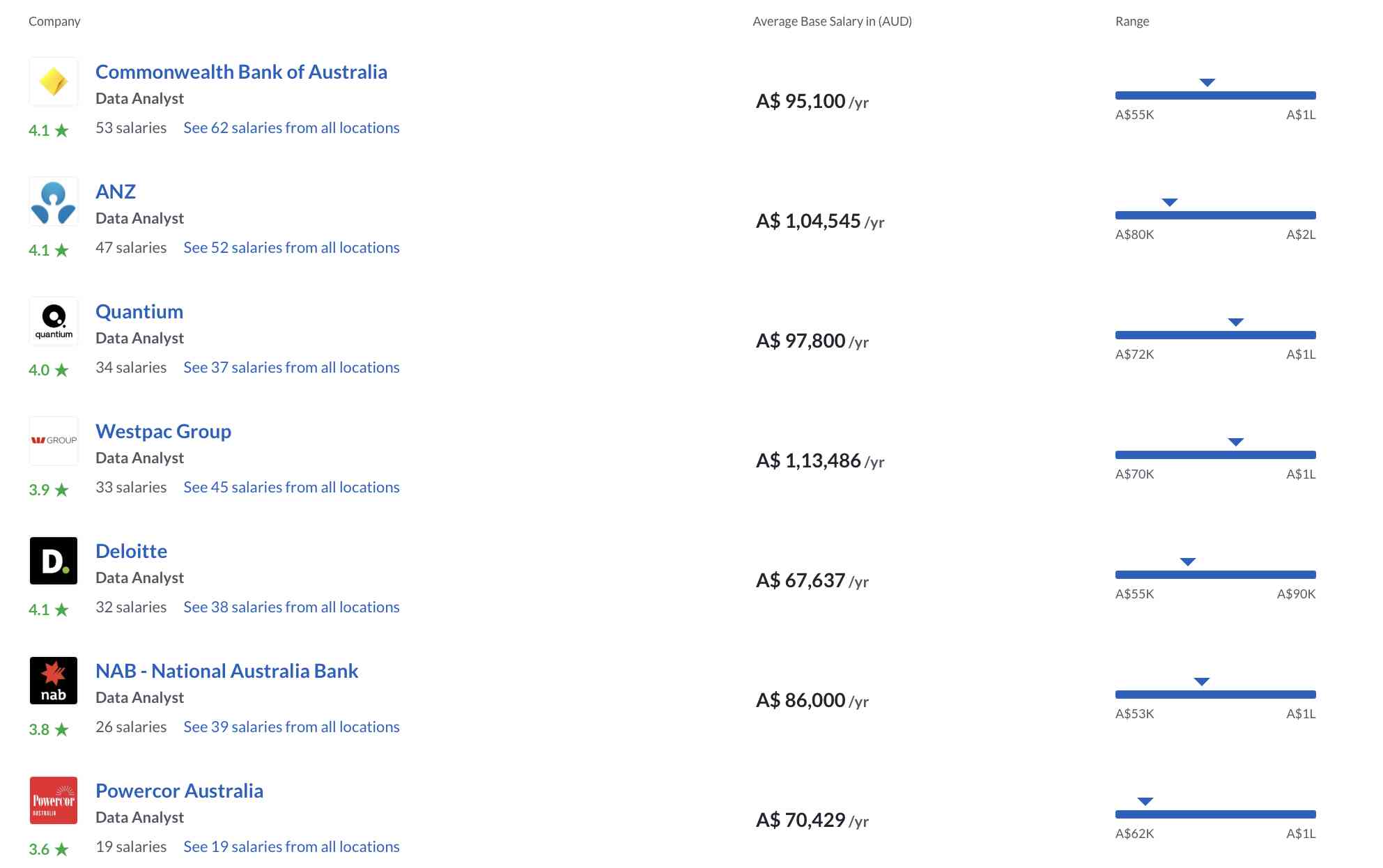
Important Tips for You
The salary ranges vary depending on the skills, tools, and amount of work involved. At the entry-level, you may just have to gather the data from one source and filter or clean it. However, as you grow up the ladder, you may have to collect data from various sources within the industry – for example, competitors, surveys, research, past data, and so on. Also, you must be able to do more complex tasks like deriving business interpretations and seeing the bigger picture.
Some industries pay more depending on the amount of research and data interpretation involved. However, you can increase your chances of getting a good package by expanding your existing skill set. This will help you take up more challenging work in less time.
You could be an architect, engineer, operations manager, or administrator and still go ahead to be a data analyst. Even if you are not from a math background or have any programming experience, you can become a data analyst.
There are plenty of free and paid courses available on the internet to learn statistics, linear regression, programming, and SQL. You can also join a professional organization or talk to other data analysts via LinkedIn, GitHub, Twitter, etc. Choose one domain and focus on sharpening your skills specific to that domain.
There are a lot of certifications and courses available on the internet.
Check out: Data Analytics Certifications
Other than the basic requirements for a data analyst, here are some tools that you can focus on
-
Spark/Hadoop
-
Scala
-
D3
-
AWS/Azure
-
MapReduce
-
Apache Hive
-
PIG
-
Machine Learning
-
ETL
You can also take up freelancing projects from Freelancer.com, Upwork, Fiverr, and others to enhance your portfolio and gain more experience. This will help you get on board a company faster and with a better package.
Skills To Become a Data Analyst
Along with technical knowledge, these professionals require soft skills.
Technical Skills
-
Statistics and mathematics to analyze data and present it in the form of trends and patterns.
-
Programming languages like Python and R to write scripts that can help you perform repetitive tasks quickly.
-
Database Management Systems (DBMS), like MySQL, SQL Server, Oracle, etc.
-
SQL for writing database queries to filter data from huge data sets quickly and efficiently.
-
Excel spreadsheets to generate reports.
-
Data management, manipulation, and visualization.
-
Solid understanding of the respective domain or industry vertical.
Soft Skills
-
Excellent communication skills.
-
Attention to detail.
-
Time management.
-
Leadership qualities.
-
Analytical thinking.
-
Problem-solving skills.
Check out: Must-Have Data Analyst Skills
Why Become a Data Analyst?
-
High in Demand
The tremendous data generation has resulted in great demand for data analysts. Transformation of raw data into information or knowledge has become the need of the hour for businesses. Hence, companies hire these professionals to make the most out of their data.
According to the US Bureau of Labor Statistics, the percentage of the employment of data analysts will grow at a rate of 23% from 2021 to 2031 .
You will never be out of a job – until companies treat data as king, your job is secure.
-
Filled with Challenges
This job is challenging, and every day new complex business problems arise. You will have loads of learning as you solve different types of problems and create new strategies. Hence, your professional growth is inevitable. Also, this helps you become strong enough to face any challenge at your workplace.
-
Immense Growth
Every day, you need to come up with different solutions. This helps you improve your analytical and creative thinking, problem-solving skills, and visual skills. You develop yourself into a better version.
-
Highest-Paying
Last and most important, it is currently the highest-paying job! You can see in the above sections the salary of data analysts. Undoubtedly, they earn sky-high salaries. Also, the more skills and experience you gain, the more will be your salary.
Career Scope of Data Analyst
Data analysis is, without a doubt, a flourishing and booming domain. You get a lot to learn and develop new skills and a handsome salary right from an entry-level position.
However, if you wish, you can advance your career and become a data scientist . Work experience and developing essential skills are all that you require.
Conclusion
Now that you know much about data analysis and the career prospects of this title. Start working on your skills by taking up courses and certifications. Whether it is your first or second career, the data analyst will stay for decades, and you will have to constantly update yourself with the industry's needs.
If you are a student, start with statistical analysis on your choice of domain. For example, the sports or entertainment industry could give you loads of data to work on. View your surroundings with a curious and creative mind and think about how to work with numbers and interpret practical results.
Pick your domain, start learning through various tutorials and books, and go for it!
People are also reading:
![Data Analyst Salary [Freshers and Experienced]](/media/new_post_images/Data-Analyst-Salary.webp)



